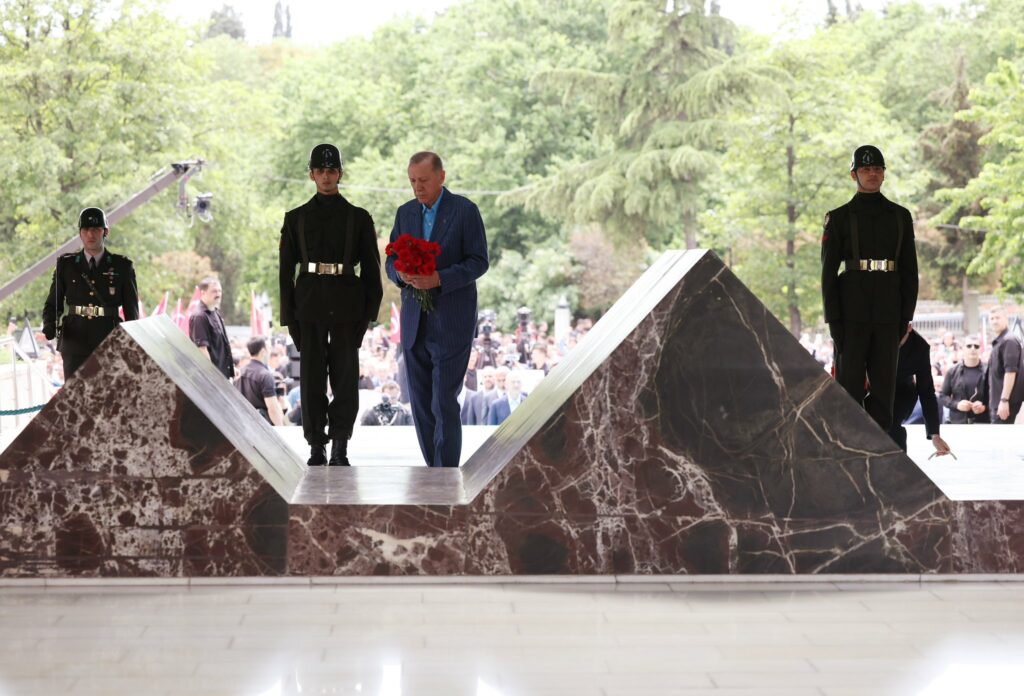Turkish President Recep Tayyip Erdoğan on Saturday paid homage to an executed prime minister who has become emblematic for Turkish conservatives in order to rally his base on the eve of a historic runoff election.
Erdoğan’s visit to Istanbul’s Adnan Menderes mausoleum took him back to the man he cited when he announced elections on May 14, the day Turkey held its first free election in 1950, in a bid to extend his rule into an unprecedented third decade.
Menderes was tried and hanged one year after the military staged a coup in 1960 to put Turkey back on a more secular course.
Erdoğan survived a putsch attempt against his own Islamic-rooted government in 2016.
“The era of coups and juntas is over,” the 69-year-old declared after laying a wreath at Menderes’s tomb.
“I once again call on you to go to the ballot boxes. Tomorrow is a special day for us all.”
Erdoğan told his followers in January that he wanted to continue Menderes’s fight for religious rights and nationalist causes in the officially secular but overwhelmingly Muslim republic of 85 million people.
He paid a similarly symbolic visit to Istanbul’s iconic Hagia Sophia mosque on the eve of the first round.
His conversion of the ancient seat of eastern Christianity into a mosque in 2020 cemented his hero status among poorer and more rural voters who have helped keep him in power since 2003.
Erdoğan ended up beating secular opposition leader Kemal Kılıçdaroğlu by nearly five percentage points two weeks ago.
But his failure to top the 50 percent threshold set up Turkey’s first runoff Sunday and underscored the gradual ebbing of Erdoğan’s support.
‘They are afraid’
Kılıçdaroğlu has focused on more immediate issues as he tries to come from behind and return power to the secular party that ruled Turkey for most of the 20th century.
He used a late-night TV interview on Friday to accuse Erdoğan’s government of unfairly blocking his mass text messages to voters.
“They are afraid of us,” the 74-year-old former civil servant said.
Observers say Turkey’s votes are free of meddling on election days — but unfair because the odds are stacked against the opposition in advance.
“These were competitive but still limited elections,” the Organization for Security and Cooperation in Europe (OSCE) election observer mission’s chief Michael Georg Link said after the first round.
“The criminalization of some political forces … prevented full political pluralism and impeded individuals’ rights to run in the elections,” Link said.
Opposition supporter Zerrin Altaylı said she thought Kılıçdaroğlu would win a fairly held vote.
“I hope the votes come out of the ballot boxes without any fraud,” the 60-year-old said. “If that happens, the results will be different than in the first round.”
‘Creating fake news’
Erdoğan’s first decade in power was distinguished by strong economic growth and warm relations with Western powers that elevated his global status and domestic support.
His second began with a corruption scandal and soon descended into a political crackdown and years of economic turmoil that erased many of the early gains.
Erdoğan’s consolidation of power included a near-complete monopolization of the media by the government and its business allies.
Reporters Without Borders (RSF) estimated that Erdoğan received 60 times as much airtime on the TRT Haber state broadcaster as Kılıçdaroğlu in April.
“They have taken over all the institutions,” Kılıçdaroğlu said in his television interview.
Erdoğan used his own TV appearance Friday to attack Western coverage of the campaign.
“They are more interested in the elections in Turkey than in their own countries,” Erdoğan said. “But they are always creating fake news.”
Economic peril
The vote is being accompanied by growing alarm about the fate of Turkey’s beleaguered lira and the stability of its banks.
Erdoğan forced the central bank to follow through on his unconventional theory that lower interest rates bring down inflation.
The exact opposite has occurred.
Turkey’s annual inflation rate touched 85 percent last year while the lira entered a brief freefall.
The lira has been holding remarkably steady this year — a sign the government is ploughing vast sums into market interventions to avoid politically sensitive falls.
The central bank’s net foreign currency holdings last week dropped into negative territory for the first time since 2002.
Economists feel that Erdoğan’s government will need to reverse course and sharply raise rates or stop supporting the lira if it wants to avoid a full-fledged crisis after the vote.
But retiree Nurdan Karaç said she cared more about “continuity” than personal wealth.
“The economy might have been bad yesterday and get better tomorrow,” she said.
“But what is important is our country, our people and our government.”
© Agence France-Presse

